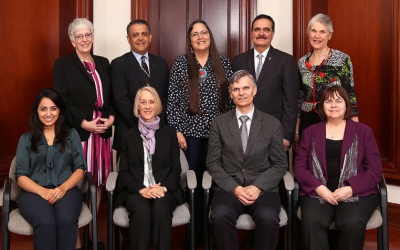Национальное духовное собрание бахаи Канады 171 г. Э.Б. (2014-2015 гг.)
Состав Национального духовного собрания бахаи Канады 171 года Эры Бахаи (2014-2015 гг.)
Toronto, Ontario, 28 April 2014 (CBNS) — At the annual Baha’i National Convention, held in Toronto over the weekend of 25–27 April, delegates from across the country elected the national governing council of the Baha’i Community of Canada, the National Spiritual Assembly.
The members elected to the governing council for a one-year term are Deloria Bighorn, Karen McKye, Mehran Anvari, Hoda Farahmandpour, Enayat Rawhani, Judy Filson, Élizabeth Wright, Ciprian Jauca, and Susanne Tamás. Karen McKye will serve as the secretary, the chief executive officer of the National Assembly, over the coming year, and Deloria Bighorn will serve as chair.
Like all elections of Baha’i institutions, the election was conducted by secret ballot, with no campaigning or reference to individuals. Instead, delegates base their decisions on criteria laid out by the central figures of the Baha’i Faith. Those criteria include, among others, qualities like loyalty, selfless devotion, a well-trained mind, recognized ability and mature experience.
The prayerful and reflective atmosphere at the convention created a spirit of dignity, which Baha’is view as an essential element of elections, an aspect of the reciprocity and respect that should infuse the relationship between individuals, institutions and the community. Elections for Baha’i local and national governing councils are held each year during the most important of the Baha’i holy days, the Festival of Ridvan, which lasts for twelve days, from 21 April to 2 May.
In addition to the election of the National Spiritual Assembly, the convention reviewed the progress of the development of the community and discussed the Baha’i world community’s Five Year Plan of action, which is in effect from April 2011 to April 2016, and the latest message received from its international governing council, the Universal House of Justice.
The plan addresses some of the most fundamental challenges facing humanity at this time. Central to the plan and its current success has been an upsurge throughout the world of coordinated and coherent action at the grass-roots level that involves meetings that strengthen the devotional character of the community, classes that nurture the hearts and minds of children, groups that empower youth to serve their communities, and study circles aimed at applying Baha’i teachings to individual and collective life. Convention delegates spoke movingly of the importance of working, hand in hand, with Canada’s Aboriginal peoples in order to overcome injustice, giving particular attention to the capacity and potential of the younger generation.
The message of the Universal House of Justice noted the gratifying progress of the plan of action that Baha’is around the world have been pursuing. In characterizing the communities that have progressed furthest, the Universal House of Justice wrote, “The most dynamic clusters are those in which, irrespective of the resources the community possesses or the number of activities being undertaken, the friends appreciate that their task is to identify what is required for progress to occur—the nascent capacity that must be nurtured, the new skill that must be acquired, the initiators of a fledgling effort who must be accompanied, the space for reflection that must be cultivated, the collective endeavour that must be coordinated—and then find creative ways in which the necessary time and resources can be made available to achieve it. The very fact that each set of circumstances presents its own challenges is enabling every community not simply to benefit from what is being learned in the rest of the Bahá’í world but also to add to that body of knowledge.”
Canadian Baha’is are among other national Baha’i communities eagerly pursuing the plan, which is conceived as a systematic effort to learn how to serve the needs of the world’s children and youth, how to advance social practices characterized by moral and spiritual principles that strengthen a collective consciousness of humanity’s oneness and unity among all the peoples of the world, and how to create the foundations of a peaceful and prosperous world civilization.
Источник: [1]
